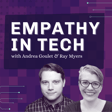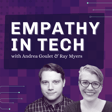
Empathy, Identity, and Collaboration with Zhou Fang
Zhou Fang is the founder of Intersectional Group - a leadership, people and culture practice with a focus on intersectionality, empathy, compassion, intentionality, as well as curiosity.
Zhou is a passionate advocate for pay transparency and equity, mental wellbeing, immigration reform, and climate justice, as well as a committed ally for the LGBTQ+ and Indigenous communities.
Currently, Zhou serves on the board of Portland HR Management Association, as well as a thought leader for the Policy Committee at Women’s Foundation of Oregon. She is also the producer and host of The Intersection, a podcast program about intersectionality, identity, leadership, and personal journey.
Outside of work, Zhou is a proud dog and plant parent and a comedy and horror movie enthusiast. She appreciates good food and loves to travel.
LINKS
- Intersectional Group
- Zhou’s LinkedIn
- Instagram: @intersectionalliving
- Podcast: The Intersection
- Kimberlé Crenshaw - Wiki
HOSTS
- Andrea Goulet LinkedIn | andreagoulet.com
- Ray Myers LinkedIn | Craft vs Cruft on YouTube
ABOUT EMPATHY IN TECH
Empathy in Tech is on a mission to accelerate the responsible adoption of empathy in the tech industry by:
- Closing the empathy skills gap by treating empathy as a technical skill.
- Teaching technical empathy through accessible, affordable, actionable training.
- Building community and breaking down harmful stereotypes and tropes.
- Promoting technical empathy for ethics, equity, and social justice.
Learn more at empathyintech.com

